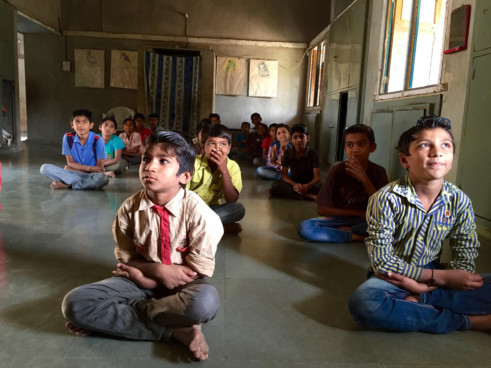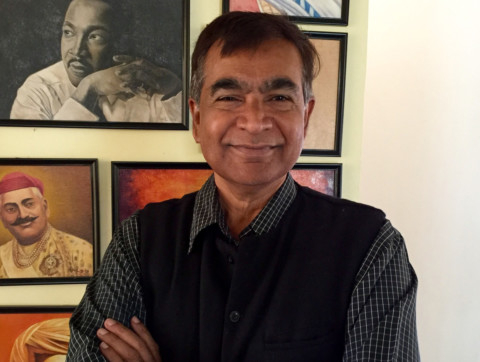
KHETATIMBI, gujarat
Dudhabhai Kalabhai knew the rules: He could stand outside the village temple and join his hands in a quick, whispered prayer. He was not to linger or attempt to climb the steps.
As a Dalit, part of the lowest rung of Hinduism’s ancient caste system, his mere touch, to some, would render the shrine unclean.
But one morning in March 2015, two upper-caste villagers thought Dudhabhai ventured too close to the temple entrance. They thrashed the 70-year-old farmer with sticks, leaving him hospitalised with arm and leg injuries.
Family members said police in the western Indian state of Gujarat at first refused to take the case seriously. It wasn’t until the human rights group Navsarjan deployed representatives and a lawyer that the assailants were arrested, tried and sentenced to two-year prison terms.
It was one of thousands of cases that Navsarjan has fought since 1988 on behalf of Dalits, formerly known as “untouchables,” who continue to endure social stigma and economic marginalisation 70 years after India’s Constitution outlawed caste-based discrimination.
Now the non-profit group finds itself under attack, accused by India’s government of harming the national interest.
In December, India’s Ministry of Home Affairs blocked Navsarjan from receiving funding from overseas, which accounts for almost all of its $400,000 (Dh1.46 million) annual budget. The group said it would have to lay off its 80 staff members and suspend its charitable work — including three schools educating 102 Dalit children — if the decision isn’t reversed.
The action is part of a widening Indian government crackdown against civil society organisations that critics say is politically motivated.
Officials last month cancelled the foreign funding licences of at least two dozen non-profit groups for alleged “anti-national” activities.
There are few domestic funding sources for human rights organisations in India, where philanthropy outside the corporate sector is limited, meaning most rely on foreign donors. A law called the Foreign Contribution Regulation Act, or FCRA, in effect gives the government control of non-profit groups’ purse strings — and can be used to stifle dissent.
Navsarjan staff members believe their group was stripped of its FCRA licence for organising protests last summer after seven Dalits were publicly flogged in Una, a town in southern Gujarat, for skinning a cow that had been mauled to death by a lion. Handling cow carcasses is one of many lowly occupations assigned to Dalits by upper-caste Hindus, who regard the animal as sacred. The attackers were self-styled “cow vigilantes” who wrongly accused the Dalits of killing the animal.
Abrupt cancellation
The group also helped lead a campaign that forced investigators in August to reopen an inquiry into a 2012 police shooting that killed three young Dalit men. Four officers suspected in the case have not been charged.
“Navsarjan put a lot of pressure, and the government didn’t like it very much,” Martin Macwan, a Gujarati-born Dalit who founded the organisation, said in an interview. “They decided to hit us where it hurts.”
A Home Ministry spokesman, Kuldeep Singh Dhatwalia, said that “no cancellations of licences [were] politically motivated” and that the decisions were made according to the law.
Nearly half of Navsarjan’s financing comes from US sources, including the Unitarian Church and Asha for Education, a volunteer group, Macwan said. Its funding certificate was renewed as recently as August, just as the Una controversy was heating up.
On December 15, the Home Ministry abruptly cancelled the renewal, saying it had been granted “inadvertently.” In a letter, it accused Navsarjan of carrying out “activities detrimental to national interest” and aiming to upset religious and caste harmony. It offered no further explanation.
The government is particularly sensitive to social unrest in Gujarat, a prosperous coastal state that Prime Minister Narendra Modi led until 2014, and is still run by his party. The powerful prime minister has held up Gujarat as a model of economic development, but recent protests by Dalits and other marginalised groups have chipped away at that carefully constructed image.
In parliamentary debates following the Una beatings, opposition lawmakers referred to a landmark 2010 survey that researchers from Navsarjan and the Robert F. Kennedy Centre for Justice and Human Rights carried out in 1,589 Gujarat villages. The findings laid bare how many Dalits, who make up more than 16 per cent of India’s 1.25 billion people, are still treated as subhuman.
Outwardly, nothing sets Dalits apart from other Indians. But caste is hereditary, and in places where the premodern hierarchy is still observed, people born as Dalits are seen as intrinsically impure, able to defile something merely by touching it.
In 90 per cent of villages, Dalits were not allowed to enter temples, the survey found. In 53 per cent of villages, Dalit children were seated separately from others during school lunches. In roughly half the villages, Dalits were forced to use separate cups at tea stalls and barred from entering shops.
“This report took all the air out of the so-called ‘Gujarat model’ of development,” Macwan said. “It showed that development and inequality can coexist.”
‘We had no awareness’
In Khetatimbi, a hamlet reached by dirt roads three hours from the state capital, Dalits are now allowed inside the temple. But after Dudhabhai’s family complained to police about the beating, upper-caste families retaliated by refusing to serve Dalits at village shops for several months.
The harsh rural practice — known in India as a social boycott — persisted for months, until Navsarjan staff got the police to intervene.
“Before Navsarjan came, we had no awareness of our rights,” said Punnabhai, the son of the farmer who was beaten outside the temple in March 2015.
Still, there have been setbacks. The assailants appealed their convictions and were freed on bail. Last year, Dudhabhai died of an unrelated illness.
India bills itself as the world’s largest democracy, but it has long nursed a deep-seated distrust of civil society groups, particularly those backed by Western countries.
The contributions law “is a sword dangling over the head of every (non-governmental organisation) who receives foreign funding,” said Indira Jaising, a former government solicitor whose legal aid group, Lawyers Collective, lost its licence last year.
Jaising’s clients have included Teesta Setalvad, who has led the legal battle to have Modi convicted of complicity in deadly 2002 religious riots in Gujarat; a former police official who has offered testimony in the case; and a Greenpeace employee who was barred from travelling to Britain to speak out against India’s use of coal-based energy.
Greenpeace’s licence was revoked, too, until a court intervened last month and stopped the move.
— Los Angeles Times













